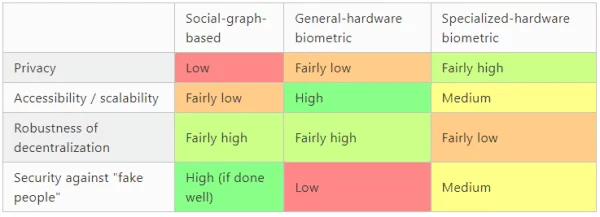Vitalik Buterin, founder of Ethereum (ETH), has expressed his concerns about Worldcoin (WLD), the new cryptocurrency launched by Sam Altman. According to him, Worldcoin’s “Proof-of-Personhood” (PoP) operation has major flaws in terms of privacy, accessibility, centralization and security.
Vitalik speaks out about Worldcoin
We reported this morning in our columns that Worldcoin (WLD), the controversial cryptocurrency of Open AI CEO Sam Altman, has officially been launched on the market. Already boasting a staggering $25 billion in diluted market capitalization (DMC), WLD is causing controversy with its sometimes dystopian operation.
This far from innocuous project, which proposes iris scanning in return for a fee, has prompted a response from Ethereum (ETH) founder Vitalik Buterin, who has published a blog post aimed at explaining what he believes is currently problematic about the Worldcoin’s “Proof-of-Personhood” (PoP).
What do I think about biometric proof of personhood?https://t.co/yozo1buW24
– vitalik.eth (@VitalikButerin) July 24, 2023
In outline, Vitalik Buterin asserts that it is vital that a decentralized digital identity system be put in place in order, among other things, to combat “spam and the concentration of power” and because this is a method that “avoids dependence on centralized authorities and reveals the minimum possible information”.
He adds that, over and above the objectives set by Worldcoin, PoP could also prove useful for distributing airdrops, for voting within decentralized autonomous organizations (DAOs), or as an alternative to captchas, among other things.
However, as things currently stand, Vitalik claims that Worldcoin’s proposed solution has 4 major shortcomings relating to privacy, accessibility, centralization and security.
What are the current dangers with PoP?
First, regarding privacy: according to Vitalik Buterin, if someone is able to scan your iris – like Worldcoin’s Orb – then they could compare it to a database to see if you already have a “World ID” and potentially extract private information from you.
Secondly, Vitalik raises the issue of Worldcoin’s accessibility. As things stand, it requires a retinal scan with an “Orb” device, which de facto limits access to the system.
Regarding centralization, Vitalik writes that the Orb is a hardware device whose structure is known only to its manufacturer. This means that there is no way of knowing for sure that Worldcoin does not have a “back door” or a loophole.
As far as security is concerned, Ethereum’s founder explains that an individual could be forced to scan his or her iris under threat, or that it could be possible to produce false World IDs using a 3D printer, for example.
In his view, the ideal system would be based on a combination of social graphs, general biometric techniques and specialized hardware biometric techniques, each with its own advantages and shortcomings, but all complementary when combined with its peers:

Finally, Vitalik reiterates that a PoP-based system must come into being, but that this is indeed a major challenge that will take “years” to solve:
“The problem of creating an efficient and reliable proof-of-identity system, especially in the hands of people far removed from the existing cryptographic community, seems to be a real challenge. I certainly don’t envy the people who are tackling this task, and it will probably take years to find a formula that works. […] I look forward to seeing progress on all types of proof of identity, and hope that the different approaches will eventually coalesce into a coherent whole.”
